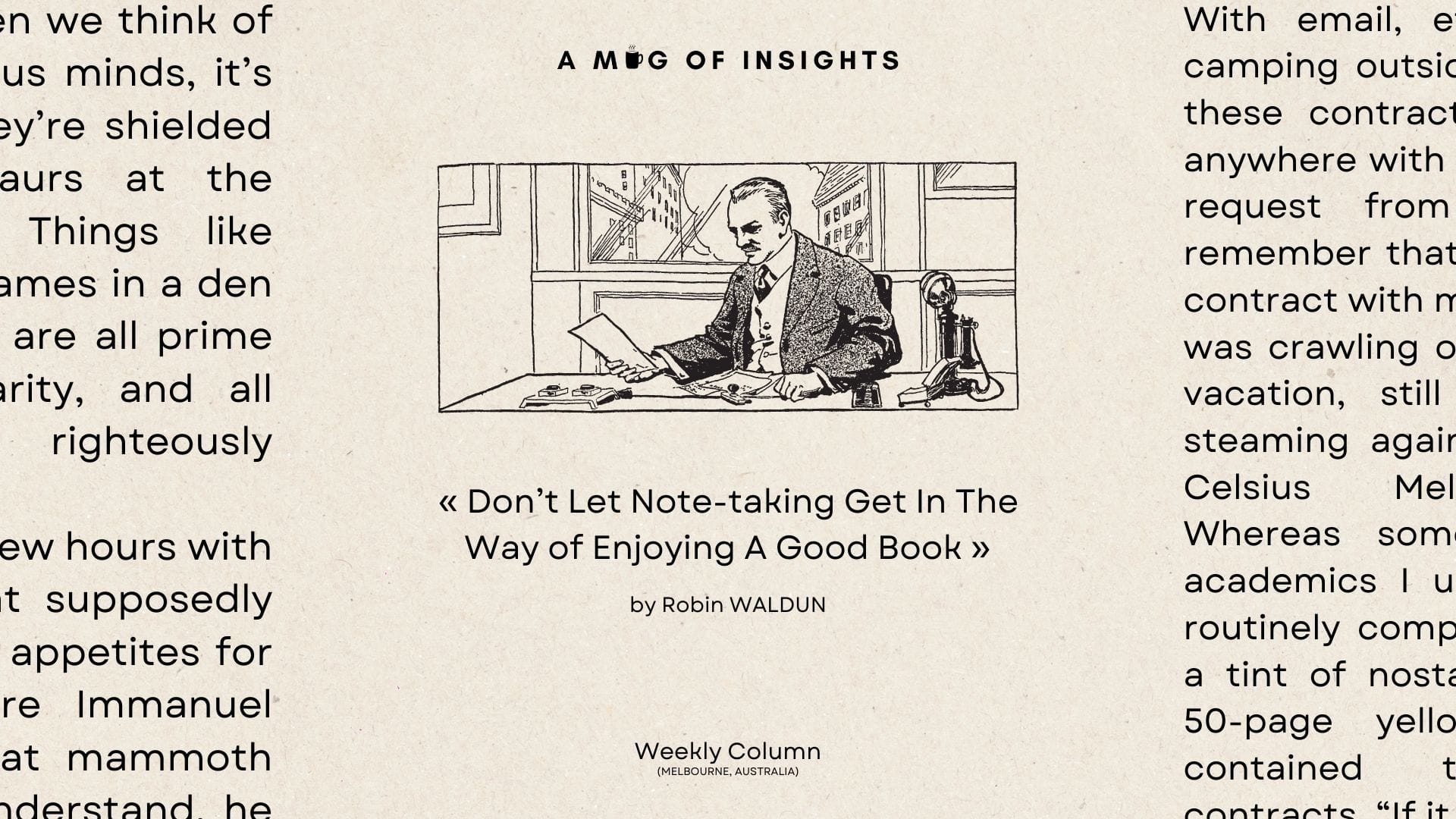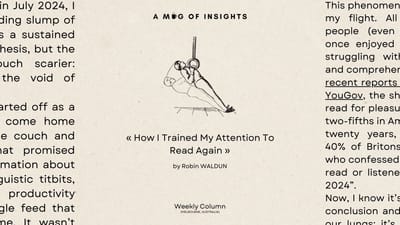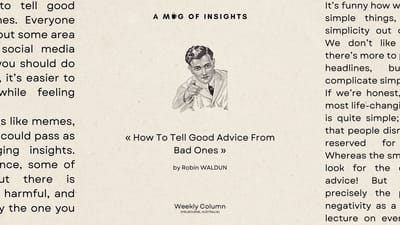Don't Let Note-taking Get In The Way of Enjoying A Good Book

Welcome to the weekly column from A Mug of Insights' new home! From now on, I'll dispatch these letters on Saturdays, and paid subscribers will receive their 1-2-Read letters on Mondays. If you like what you're reading, consider upgrading to the Grande tier for journal prompts and a practical exercise every week to strengthen your reading muscles! Thank you for reading, and I look forward to seeing you next week.
In an interview published in The Paris Review under the title “The Art of Criticism No. 5”, the American literary critic Fredric Jameson confessed that before he started reading “serious novels”, he was utterly obsessed with detective fiction.
“I wasn’t precocious, [and] if I got interested in a certain detective, or a certain detective writer, I would try to collect all the novels by that writer.”
How strange, right? When we think of the upbringings of serious minds, it’s easy to assume that they’re shielded from what the dinosaurs at the academy call vulgar. Things like detective novels, crap games in a den and blockbuster movies are all prime suspects of this vulgarity, and all serious minds should righteously abstain from them.
However, it only takes a few hours with a biography to see that supposedly serious minds had great appetites for all things vulgar. Before Immanuel Kant started writing that mammoth everyone pretends to understand, he frequented the Keyserlingk palace and rocked the card dens with exemplary skills. Similarly, the Nobel Laureate writer Toni Morrison was glued to cable news when she caught a break from writing. Even the austere Professor Wittgenstein couldn’t resist the first row of a cinema right after he wrapped up his lectures.
See, everyone, including serious minds, has preferences that are downright strange and incompatible with their public-facing reputations. But these are precisely the contradictions we cherish because they give us an intimate glimpse into the humanity behind their bodies of impressive output. However, the same sympathy we extend to other people’s idiosyncrasies is rarely applied to ourselves.
The Rise of Productivity Pr0n
What I’m talking about is a strange phenomenon that started back in the early 2000s. See, the decade before (the 1990s) witnessed many miracles: the Hubble Space Telescope, DVDs and the legendary Nintendo 64. But another invention soon proved to be the turning point where, in Fran Lebowitz’s words, “the whole world went inside the computer”. Yes, we’re talking about that bottomless pit called email.
This technology was a miracle to some. In a recent newsletter by Cal Newport, he described how email changed the workflow of a woman who worked in mergers and acquisitions.
“If I was expecting a new version of a merger agreement, I would have to stand outside the fax room waiting for my 200-page document and then call to ask the other side to re-fax any missing pages,”
With email, et voilà, no more camping outside the office. Now these contracts can be signed anywhere with a simple DocuSign request from our phones. I remember that I signed my book contract with my publisher when I was crawling out of an onsen on vacation, still half naked and steaming against the 5 degrees Celsius Melbourne winter. Whereas some of the senior academics I used to work with routinely complained, albeit with a tint of nostalgia, about those 50-page yellow packets that contained their publishing contracts. “If it lands in the wrong pigeonhole, I’ll be in trouble for the next three months”, one source told me. However, this technology also bred more woes than the unanswered emails in our inbox.
In a 2020 article from The New Yorker: “The Rise and Fall of Getting Things Done”, the story of Merlin Mann captured the excesses of email-overwhelm in a harrowing quote:
“I was in this batting cage, deluged with information.”
Work was replaced by juggling conversations back and forth. E-meetings that went nowhere ate into his free time. And for Merlin Mann’s demanding field of Web design, it was impossible to keep a lid on the crap pot of endless emails. In 2003, however, he stumbled upon a system that changed the course of his career. Yes, it was the Getting Things Done system by David Allen.
For those who aren’t familiar with the system, its central motto is essentially: capture all the tasks and execute them without stress. The capturing system frees up our working memory so that we can tackle whatever’s in front of us with a “mind like water”. I was thrilled when I discovered this system back in high school. My peers were confused when they saw the stacks of notebooks and index cards that I hauled around campus. “Why are you reading a book by Donald Trump?” One of them asked me because, apparently, David Allen on the cover of GTD looked like the presidential candidate back in 2016. However, I was far from the first one to become a disciple of Allen’s mad lab.
Merlin Mann loved the system so much that he started a blog named 43 Folders. It was so popular that the tech writer Cory Doctorow re-posted it on his site and surged the traffic, effectively turning the blog into a full-time job overnight. With this influence, Mann eventually popularised the term: productivity pr0n to describe blogs & outlets that teach people how to manage their out-of-sorts inboxes and obligations in the digital economy. And “the hunger for his pr0n, [Mann] noticed, was insatiable. People were desperate to tinker with their productivity systems.” It made sense. As the digital economy applied more pressure for people to perform in the midst of new technologies of distraction, developing systems to tackle them was the natural choice. But, as it turned out, this honeymoon with productivity systems was short-lived for Mann.
When a system becomes an end in itself
In 2007, Merlin Mann was caught in a dilemma. At this point, he was writing about productivity for a living, but he was also living productivity. It created the perfect strange loop where a system became an end in itself, leaving Mann in a maze where he’d end up precisely where he had started after climbing Escher’s stairs. 4 Years later, in a post titled “Cranking”, the signs of an impending collapse were evident:
“I’d type and type. I’d crank and I’d crank… I’m done cranking.”
And *poof*, Mann disappeared, and 43 Folders came to an end. But just like an irresponsible fiancé leaving the altar, the aftermath raged on.
The key problem with productivity systems, as Mann described, was that it’s
“a bewildering, comlexifying end in itself–list-making as a ‘cargo cult,’ system-tweaking as an addition.”
Now on platforms such as TikTok, Instagram and YouTube, the problem is amplified. There's always another system to adopt, another routine to optimise and another version of ourselves around the corner. The closer we are to some Platonic ideal of productivity, the better. Yet, as we can see from Merlin Mann’s fallout with Getting Things Done, if we always try to adopt external routines and systems without checking in with ourselves, the systems will begin to run us as we turn our backs on the things that matter.
Reclaiming our autonomy from systems
And all that brings us to a terrifying conclusion. In this case, trying to adopt someone else’s system wholesale is the same as trying to become a philosopher by reading detective novels. We wish to buy knowledge we did not earn. We are always looking for a gimmick to become someone else’s version of productive, and we refuse to believe that our ideal system is in us, not out there.
All the most sustainable systems (note-taking, reading, time management) have to come from something deeper: what are you trying to achieve, and what are you curious about? No one can answer this for us, and no fancy note-taking technique can absolve us from the messy process of figuring this question out.
This isn’t to say that all advice and systems are useless, but most, if not all, are developed in retrospect when someone created it in reaction to a problem they want to solve. For Mann, it was his email crisis. For the old dinosaurs in the academy, it was a missing envelope in the pigeonhole, and for me, it was the frustration of not being able to get back to reading after graduation. And if we detach these systems from their contexts and wave them around as the next thing that will magically change your life, then an impending collapse isn’t just probable, it’s guaranteed.
So, allow me to propose an alternative to blind system worship: resonance.
Keep a resonance journal
In last week’s video, I answered an email from a subscriber, Kade, who was struggling to find a suitable system to manage his readings.
“I've tried to develop all the different ways to read (Adler's 4 levels), my attempt at notetaking has been a horribly inconsistent commonplace book, and being so pressed for time, I'm not getting the nutrients out of a book that I want to.”
And the advice I gave him applies to everything we’ve discussed here: keep a resonance journal. See, Kade is an 18-year-old high school senior, and expecting himself to follow suit with a needlessly Byzantine system is not only unrealistic but unnecessary.
Kade, along with many others, is in a discovery phase. They have to, first of all, figure out what they want to read before they can worry about all the elaborate ways to capture what they’ve learned. The trap in this phase is to blindly adopt recommendations from other writers, blogs and videos (including mine) while assuming that the system will absolve them of all the efforts of self-discovery. So, instead of putting on all that added pressure, the only thing to worry about here is finding what interests you.
Whenever you read something that sparked a hint of joy, note it down in your resonance journal in a few sentences. That’s it. And at the end of the month, compile all these moments and list out potential books/sources that interest you. No bells and whistles, no analytical and syntopical reading. These reading techniques come in handy way later as tools to enhance your experience, not as ends in themselves that will magically change everything. The journal’s only purpose is to give you a strong inner compass so that eventually you’ll experiment and land the system that will work for you.
So, in short, don’t worship systems, tune into yourself.
Until next week
Robin
Subscribe to my newsletter to get the latest updates and news




Member discussion